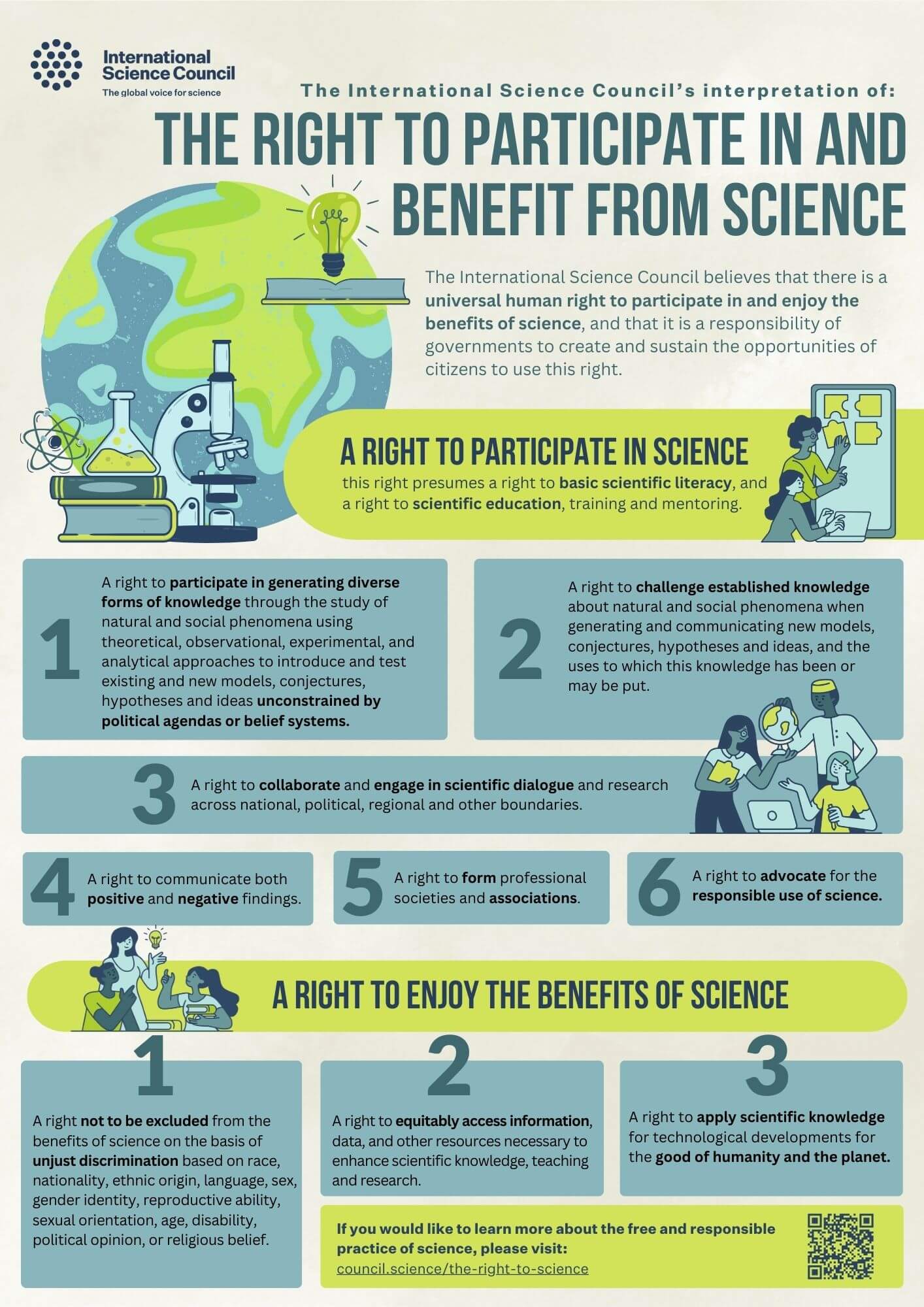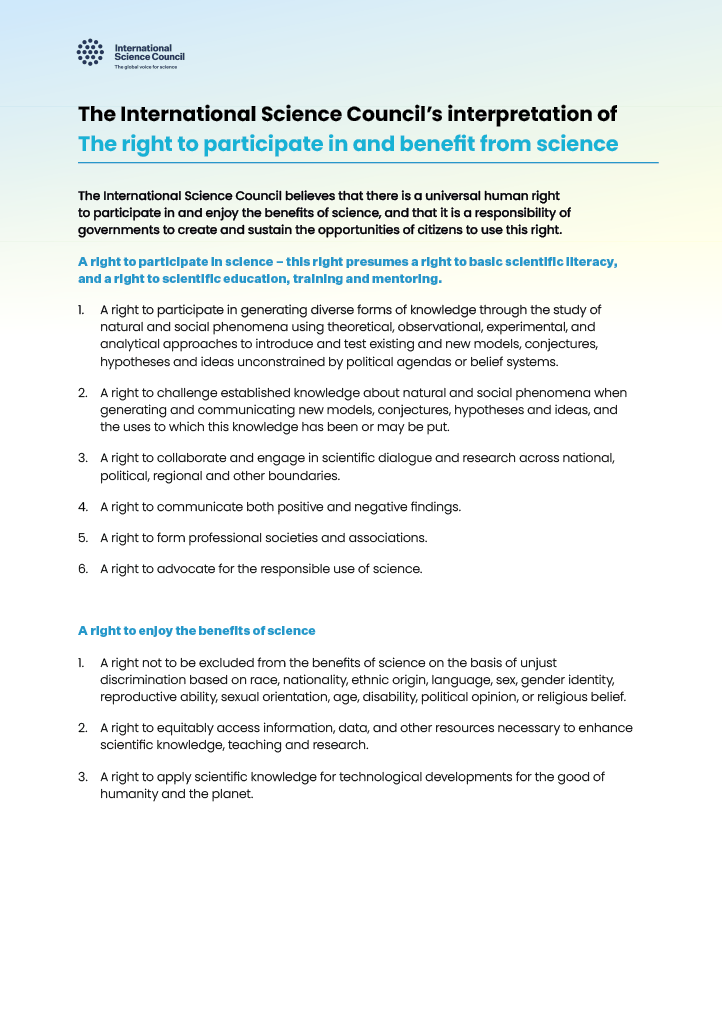
The ISC’s interpretation of ‘the right to participate in and benefit from science’ provides a clear framework for understanding the right to science, emphasizing its application in research, policy, and global access to scientific knowledge. It clarifies the obligations, opportunities, and responsibilities in ensuring universal access to science, fostering global dialogue to shape a more inclusive and sustainable future.
Participating in and benefitting from science (abbreviated to ‘the right to science’) is a universal human right, but the understanding and application of this right has been problematic. State obligations regarding the right to participate in and benefit from science have been neglected, while the implications for scientists – including the fundamental existence of this right – remain overlooked by the global scientific community.
Critical elements within science and the science-policy interface remain poorly understood and underdeveloped. These include the view of science as an intrinsic part of human culture, the importance of education and access to science as a human right, the obligation to protect knowledge producers and the production of knowledge, and the aspiration for truly universal access to the use and benefits of science.
The ISC’s interpretation clarifies what ‘the right to science’ means, and how it will shape the practice of science, and the use of the knowledge generated.
The right to participate in and benefit from science is a normative framework that challenges us to consider what our rights should be in engaging with and using science. This overlaps with the ISC’s Principles of Freedom and Responsibility in Science, which urge us to reflect on the conditions -freedoms to be protected and responsibilities to be upheld – that enable scientific progress for the peaceful and sustainable development of humanity. The right to participate in and benefit from science aligns with these Principles by setting ideal aspirations for rights and freedoms, while also balancing them with responsibilities and limits.
Both Principles are essential to the ISC’s vision of science as a Global Public Good, which positions science as a beneficial resource that should be freely and permanently accessible and available to anyone.
Without protecting the free and responsible practice of science, and without universal recognition of the right to participate in and benefit from science, this vision of science’s central role in society cannot be realized. As respect for scientific freedoms and adherence to scientific responsibilities decline globally, the global scientific community faces significant pressure to address the multiple, intersecting, and existential threats confronting our societies.
Therefore, the right to participate in and benefit from science must be more consistently recognized as the universal human right that it is.
The International Science Council believes that there is a universal human right to participate in and enjoy the benefits of science, and that it is a responsibility of governments to create and sustain the opportunities of citizens to use this right.
This right presumes a right to basic scientific literacy, and a right to scientific education, training and mentoring.
The ISC sees this interpretation of the right to participate in and benefit from science as a living document. Led by the Committee for Freedom and Responsibility in Science, the ISC’s membership has the opportunity to engage regularly to ensure our work remains relevant.
The ISC’s interpretation of the right to participate in and benefit from science raises awareness of the importance of this right – and obligations towards it – throughout the scientific, human rights, and policy communities. The ISC’s interpretation aims to encourage wide discussion and to contribute to the continual development of the right to participate in and benefit from science in ways that will benefit all people everywhere.

The Right to Participate in and Benefit from Science
Download and print our poster on the ISC’s interpretation of the right to participate in and benefit from science. Support the ISC’s mission to raise awareness by displaying it in your office, lab, or classroom, and share it with your colleagues and community.
DownloadThe right to participate in and benefit from science (referring to all rights, entitlements, and obligations related to science) is briefly considered in Article 27 of the Universal Declaration of Human Rights (UDHR, 1948), and in Article 15 of the International Covenant on Economic, Social and Cultural Rights (ICESCR, 1966), but neither of these documents offer much specificity as to the extent of the right, its limits, and obligations towards it. These are, however, discussed at length in ‘General comment No. 25 on article 15: science and economic, social and cultural rights’ (2020). What we need now is a more concise articulation of the right to participate in and benefit from science and its practical applicability to how science is done and how scientific knowledge is used.
These explanatory notes offer additional information for each section of the ISC’s interpretation of the right to participate in and benefit from science, elaborating on the reasoning behind their inclusion, and on their implications for the practice of science and the use of scientific knowledge.

A guide to the ISC’s interpretation
Download the guideWe invite you to share your thoughts and feedback on the ISC’s interpretation of the right to participate in and benefit from science. This interpretation aims to foster broad discussion and contribute to the ongoing development of this right in ways that benefit all people worldwide.
Please take a few moments to share your insights by completing our questionnaire.
Feedback questionnaire
For any queries, contact the project lead Vivi Stavrou.
The New Zealand government has actively supported CFRS since 2016. This support was generously renewed in 2019, with the Ministry of Business, Innovation and Employment, supporting CFRS via CFRS Special Advisor Gustav Kessel, based at Royal Society Te Apārangi, and by Dr Roger Ridley, Director Expert Advice and Practice, Royal Society Te Apārangi.
 blog
blog
 blog
blog
 blog
blog